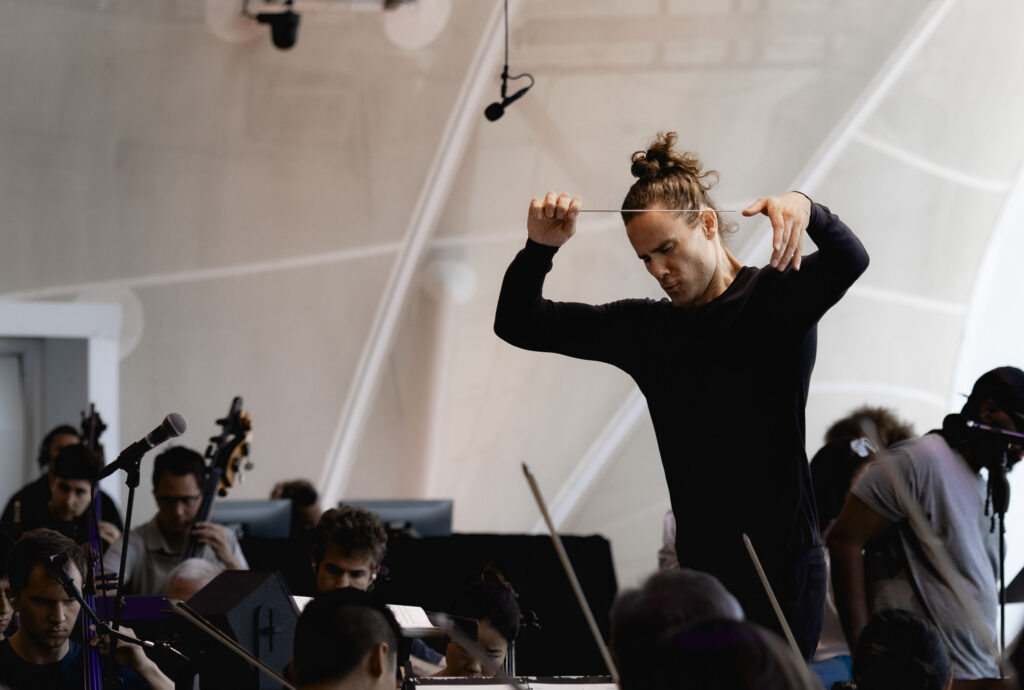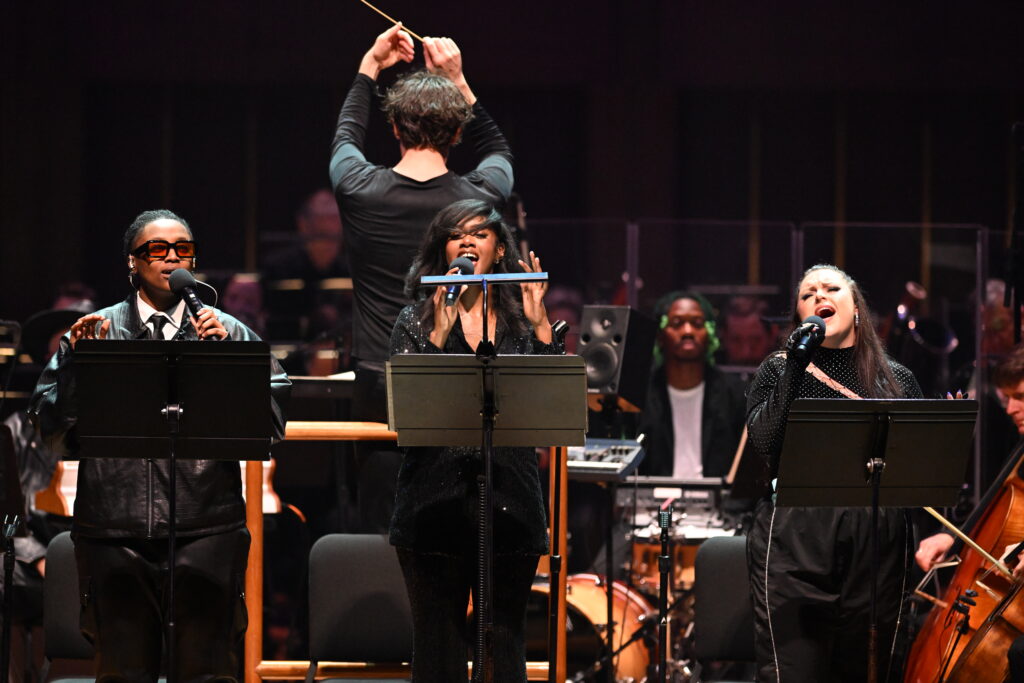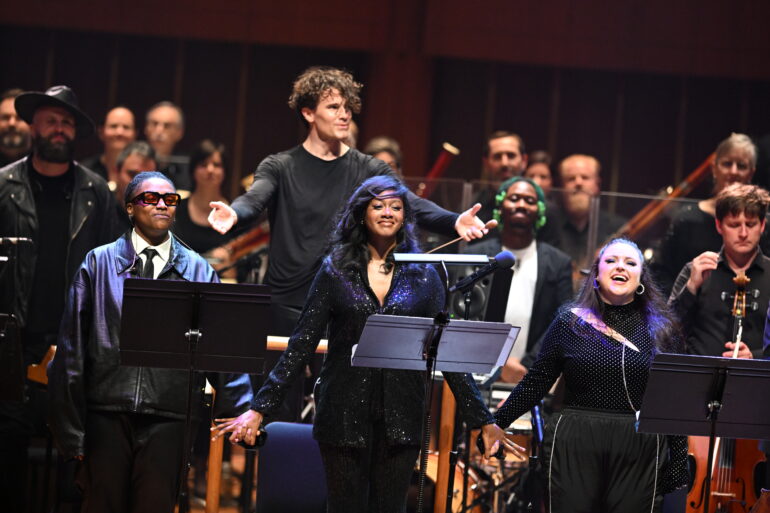When visionary composer and conductor Steve Hackman woke from a dream pairing history’s greatest symphonist with one of today’s defining pop artists, he had no idea it would lead to a movement redefining the concert experience. That dream becomes reality this fall when Beethoven X Beyoncé debuts at Chicago’s Harris Theater — a one-night-only performance uniting the Chicago Philharmonic Orchestra, three powerhouse vocalists, and a guest band in a genre-bending celebration of two musical icons.
Hackman’s orchestral mashup reimagines hits like “Single Ladies,” “Texas Hold ’Em,” and “Halo” through the lens of Beethoven’s exuberant Seventh Symphony. “Over her last few albums, Beyoncé has shown her ability to be this kind of shapeshifter through these concept albums, but still be undeniably herself,” says Hackman. “Beethoven was sort of the same. Three of his most popular symphonies have three strikingly different characters, but they’re all undeniably Beethoven. His seventh is this exuberant, joyous, dance-infused symphony. To pair it with Beyoncé just seemed obvious.”
A Composer Bridging Musical Worlds
Before Beethoven X Beyoncé, Hackman was already known for inventive orchestral mashups that pair pop icons with classical masters. His Brahms X Radiohead project — which wove the composer’s First Symphony together with songs from OK Computer — went viral and later led to Tchaikovsky X Drake and Bartók X Bjork. These genre-blending concerts have been performed by major symphonies from Seattle to Atlanta, attracting sold-out crowds and national media attention.
That’s where Lori Dimun, CEO of the Harris Theater, first discovered his work. “I’m a giant Radiohead fan, and this Brahms Radiohead mashup came across my feed and I became completely obsessed with it,” Dimun says. Once she realized it was Hackman’s creation, she began exploring more of his projects and eventually invited him to collaborate with the theater. “We were looking for the right fit on timing and were interested in seeing how this could flourish as a future partnership.”
Hackman, who started playing piano at age seven, grew up in Chicago’s northwest suburbs. He attended the University of Illinois for his undergraduate degree in piano performance and later attended the prestigious Curtis Institute of Music in Philadelphia on a full scholarship.
Hackman credits all his teachers from high school and beyond for fueling his passion. “My entire journey through music is kind of a two-parallels path. It’s the classical aide and the popular side,” he says. “In high school, I was leading rehearsals and forming my own groups, doing arrangements in choir, a cappella, jazz choir, swing choir… anything I could do with music. My piano teacher at the U of I was a brilliant pianist who truly opened my world up to classical music. I fell in love with it and became obsessed.”

He was in a men’s a cappella group performing everything from barbershop to choral to contemporary pop songs. “That was my ‘pop’ experience, so I got great training in both.” One summer break, he went to Aspen to a music festival to study piano and fell in love with the orchestra. “I heard the orchestra and saw the conductor and thought, I want to do that,” says Hackman. “The orchestra has the ability to be such a transformative collective. Some of the best music that’s ever been written is for a symphonic orchestra. I love the grandeur of it, the emotional scope.”
While at Curtis, Hackman noticed a trend in the separation between classical and popular music. “The further up the ranks of classical music I was rising, the more and more detached I was from the rest of the musical world,” he says. “My classmates and colleagues just weren’t aware of popular music, and I became aware of that disconnect between the classical music world and the rest of the musical landscape. I knew there was a conversation to be had here.”
That conversation followed him into his subconscious. One night, Hackman had a dream about a music festival like Lollapalooza, but “unlimited by time,” so great classical composers could play alongside popular artists of the 21st century. “I woke up and thought that was a really wild idea,” Hackman says. “Then I started thinking of who the headliners would be, or who would be the main curators. Beethoven and Beyoncé just felt like the obvious answers, like the king and queen, basically.”

Education, Innovation, and Collaboration
The Beyoncé X Beethoven program will include an educational component with Whitney M. Young Magnet High School, where, in a brilliant coincidence, students are studying Beethoven’s Seventh Symphony this semester.
“They’re building this fusion framework that will be a year-long residency,” Dimun says. “The students will see [Hackman’s] program, he’ll do some in-person teaching, and he has great video content talking about his process, so the students can learn how to create their own mashups. I think there’s something brilliant about experiencing music in a way that’s surprising when you hear it, and it sounds so seamlessly woven together, but is also accessible because these students have heard of it.”
When it came to finding the right orchestral partner, the Chicago Philharmonic was an ideal fit. Known for pushing orchestral boundaries in their programming with live film concerts like Black Panther, accompanying Lady Gaga and Tony Bennett at Ravinia, and being the first orchestra to play Lollapalooza, the Philharmonic jumped at the chance for this gig.
“We’ve been doing genre-defying collaborations, breaking traditional expectations of what a symphonic organization is, what they do, and how they should be,” says Philharmonic Executive Director Terell Johnson. “We’re combining the strengths and forces of our organization ensemble with artists you would expect us to perform with or in places you wouldn’t normally see us. We love doing traditional, classical programs in a different way.”
“I’m really jazzed for [Hackman’s] Beyoncé X Beethoven concert,” continues Johnson. “These types of projects are just in our DNA to continue to push the envelope. What [Hackman’s] does is so interesting. He’s a chef finding interesting ways to bring in new flavors. I think it’s great and we’re excited that we get to be the ones to bring it to life.”
The Philharmonic is a longtime resident company at the Harris, making the decision to bring them in a no-brainer. “They’re really adept and invaluable when it comes to taking on whatever adventure we want to take them on,” Dimun says. “It’s always a point of pride to be able to show off your local musicians. They really are a gift to our city. Musicians who have this versatility and can play anything at that top level. They’re changing the reputation of the orchestra and where you expect to see them.”
Technology Meets Tradition
This program also welcomes a new collaboration with the company Onstage AI, which will place AI cameras in the theater to broadcast the live concert. Based in Poland with an office now in New York, this is the first time the advanced technology is being used in the U.S.
“What they’re doing is groundbreaking,” says Johnson. “I think it’s going to revolutionize the way we capture and record live music.”
Dimun sees this as a unique opportunity. “It’s an incredibly new technology that’s been primarily rooted in Europe,” Dimun says. “There is a human element to it of uploading the score and making decisions about the types of cuts you want, but once you have programmed it, this has an intelligence to know the score, and it actually picks up the tempo and will queue the camera feeds. For us to record a live performance, we’re oftentimes eliminating seats in the auditorium for the cameras. That’s the antithesis of what we’re trying to do, which is have a live performance experience.”
A Movement in the Making
More than a concert, Beethoven X Beyoncé embodies a larger shift in how America experiences orchestral music — as something alive, inclusive, and joyfully hybrid. Hackman hopes the project will inspire other symphonies and schools to join the conversation between past and present.
Harris Theater for Music and Dance presents Steve Hackman’s Beethoven X Beyoncé, November 20 at 7:30 pm, 205 E. Randolph St., Chicago. For tickets, visit harristheaterchicago.org.
How to Help
The Chicago Philharmonic continues to redefine what an orchestra can be — from symphonic collaborations with artists like Lady Gaga and the Joffrey Ballet to free neighborhood concerts that bring live music into Chicago’s parks and schools. Founded by members of the Lyric Opera Orchestra in 1989, this musician-governed ensemble now includes nearly 200 members and stands among the most versatile and forward-thinking orchestras in the country.
Your donation helps the Philharmonic continue to push boundaries — supporting genre-breaking performances, accessible community programs, and music education initiatives that inspire the next generation of artists and audiences.

More Chicago Philharmonic Stories by Better
- Chicago Matters of the Heart: Joffrey Ballet, Harris Theater, and Chicago Philharmonic
- From Blockbuster Movies to Lollapalooza: How Chicago Philharmonic Is Breaking Genre Barriers and Changing the Game for Orchestras

Vicki Crain is a Chicago-based freelance arts and culture writer and children’s book author. Her second book in The Furry Princess series was released late in 2024. For more information, visit quapublishing.com. She proudly supports NoStigmas, a global peer-led movement raising awareness and providing support for mental illness and suicide prevention.

